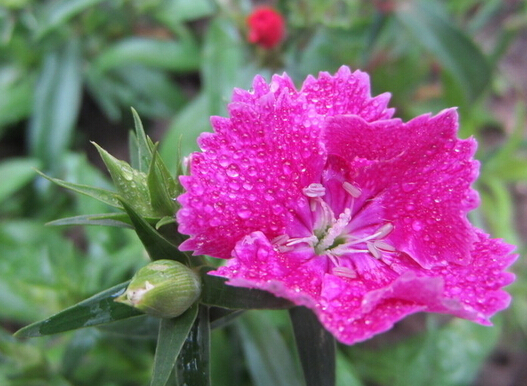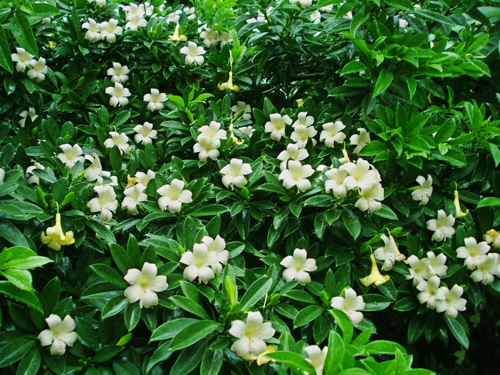Planting techniques of Hemerocallis
Hemerocallis is a perennial perennial herb of Liliaceae, also known as Zixuan, forgettable grass and so on. Xuan grassland is produced in China, but now it has gradually distributed all over the world, and its breed has reached tens of thousands of varieties. It has the effects of cooling blood to stop bleeding, reducing swelling and clearing heat, etc., can be used for the treatment of jaundice, mumps and so on, and has its high ornamental value. So how to grow day lilies? The following is the editor to introduce the planting techniques of Hemerocallis.

1. Land selection and preparation
Hemerocallis has less stringent requirements for soil than other flowers. Hemerocallis has strong growth ability and can quickly adapt to a variety of environments. It has strong moisture and dry tolerance, and although Hemerocallis needs a certain amount of light, its shade tolerance is also strong. Therefore, when selecting soil, we only need to ensure that the soil permeability is strong, drainage and irrigation is normal and there are no diseases and insect pests. After selecting the land, we should prepare the soil in time, ploughing deeply, apply sufficient base fertilizer, disinfect the soil, improve the soil structure and improve the soil fertility.
2. Sowing seeds at the right time
The seeds of day lilies are usually harvested every summer, usually sowing with harvest, but the seeds should be treated after harvest. The main purpose is to disinfect and accelerate germination, prevent seeds from carrying bacteria, and then improve the germination rate of seeds. When sowing, we should pay attention to the time, because it is not always suitable for sowing, the change of temperature and light have a great impact on the day lily, sowing time will lead to the change of yield, so it is very important to choose a reasonable planting time. It is usually sown in autumn, because the autumn temperature is suitable for the growth of Hemerocallis, and the seeds are fresh enough to germinate.
3. Water and fertilizer management
Keep the soil moist and promote seed germination after sowing, but it also depends on the weather and less watering if it is not very dry. However, timely watering in spring, lack of water, will reduce the flowering rate of Hemerocallis, so we should reasonably control according to soil moisture, weather and region when watering. It should be fertilized properly in the second year after planting, which will have a certain impact on the flowering in the second year. Topdressing about 3 times a year to meet the nutrition needs of the growth of Hemerocallis, avoid insufficient flowering and reduce the ornamental value of Hemerocallis.
4. Pest control
The disease resistance of day lily is relatively weak, so we should also do a good job in the prevention and control of diseases and insect pests. First of all, it is necessary to strengthen field management, do a good job in clearing the garden after harvest, cut off the dead parts on the ground in time, and destroy them after leaving the fields, so as to reduce pathogens. Do a good job in water and fertilizer management to enhance the disease resistance of Hemerocallis. The common diseases and insect pests of day lilies are leaf blight, red spiders and so on, so we should also do the corresponding prevention work according to these common diseases and insect pests to reduce the incidence and protect their own planting benefits.
The above is a brief introduction to the planting technology of Hemerocallis. Hemerocallis can not only be used as medicine, but also can cook, and its cauliflower is a variety of Hemerocallis. When planting Hemerocallis, we must do a good job in field management and pest control, so as to create a good growth environment for Hemerocallis. That's all for today's introduction. This article is for reference only. I hope it can help you all.
- Prev

How to grow carnation flowers?
Carnation: dianthuschinensisl morphological characteristics: Caryophyllaceae, plant height 30-50cm, stem erect or slightly creeping at the base. Leaves simple, opposite, linear, needle-shaped, base clasping. Flowers solitary or several forming Cymes; white to pink
- Next

Culture methods of ash (ash wood, African jasmine)
Ash (ash, African jasmine) scientific name: fagraeaceilanica morphological characteristics: evergreen (climbing) shrub or small Qiao. Leaves opposite, elliptic, apex protruding. Full margin, fleshy, dark green surface. Flowers solitary or cymose Cymes, Corolla funnelform, 5-lobed, white
Related
- Fuxing push coffee new agricultural production and marketing class: lack of small-scale processing plants
- Jujube rice field leisure farm deep ploughing Yilan for five years to create a space for organic food and play
- Nongyu Farm-A trial of organic papaya for brave women with advanced technology
- Four points for attention in the prevention and control of diseases and insect pests of edible fungi
- How to add nutrient solution to Edible Fungi
- Is there any good way to control edible fungus mites?
- Open Inoculation Technology of Edible Fungi
- Is there any clever way to use fertilizer for edible fungus in winter?
- What agents are used to kill the pathogens of edible fungi in the mushroom shed?
- Rapid drying of Edible Fungi

